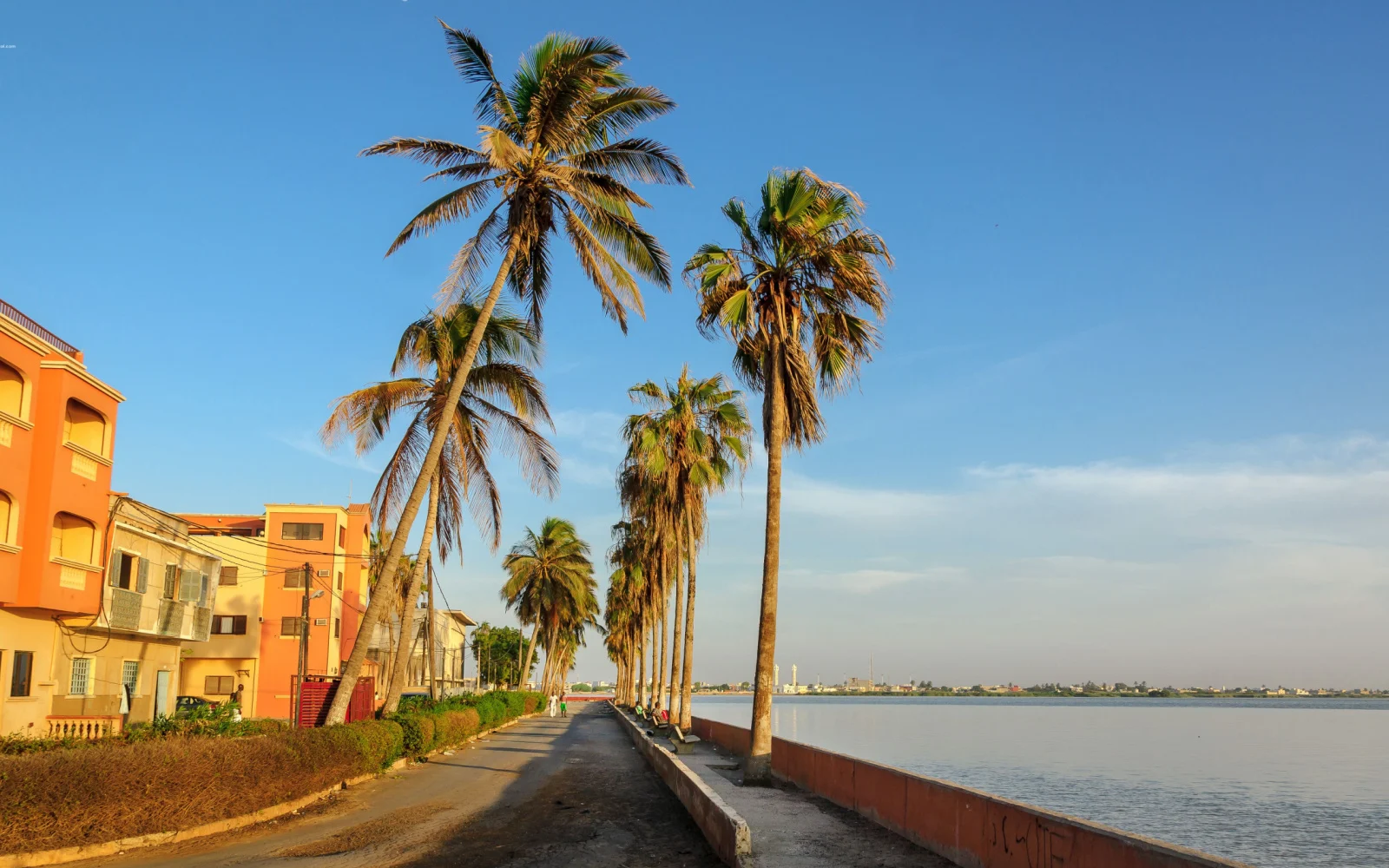Is Senegal safe to visit in 2025?
Senegal is a jewel of a country on the West African coast. Senegal hosts about one million tourists each year, and its tourism profile is steadily growing as more and more people are realizing just how beautiful the country is.
Senegal has beautiful nature and is a valuable home for wildlife, including the migratory birds you can observe at the Djoudj National Bird Sanctuary.
Many people come to Senegal to pay their respects at museums such as the House of Slaves to the millions of people kidnapped and killed by the slave trade and to honor the resilience of their descendants commemorated in the African Renaissance Monument.
But while this country is rich in history and culture, is Senegal safe to visit? We’ll show you all you need to know below.
Is Senegal Safe to Visit in 2025?
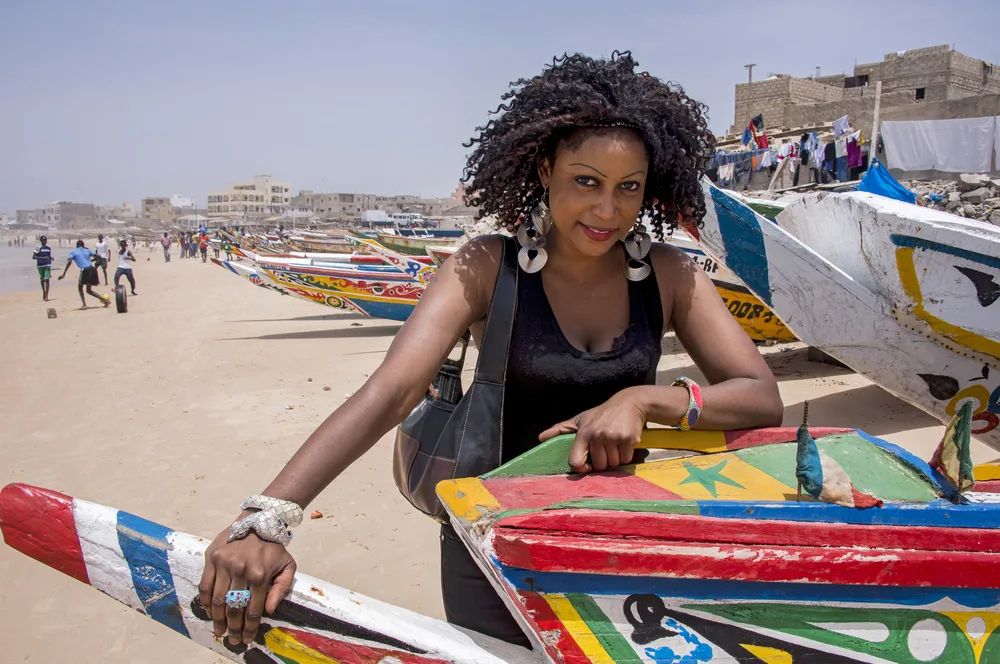
DAKAR, SENEGAL – MAY 26, 2014: Young senegalese woman, posing for a photo, next to a colorful fishing boat, on the beaches of Yoff/Salvador Aznar/Shutterstock
Yes and no. Senegal is mostly safe to visit, although you may have to take some precautions while you are there. Petty crime rates are high, and thefts sometimes turn violent.
However, rates of violent crime directed at foreigners, terrorist attacks, and political violence are low. Travel advisories for Senegal differ from government to government.
The United States State Department, normally a bit cautious, just has Senegal under a Level One travel advisory (that is a lower level than some countries people think are safer than Senegal, including France).
Other governments advise their citizens to exercise more caution when visiting the country.
For example, Canada advises its citizens to exercise a high degree of caution in Senegal due to elevated levels of crime. Criminals often target foreigners because they assume that foreign visitors to Senegal are likely more lucrative targets than locals.
Common crimes include:
- Pickpocketing
- Bag snatching
- Fraud
- Scam
- Armed robbery
- Burglary
- Highway banditry
- Kidnapping
Although Senegal’s political situation is mostly stable, especially compared to other countries in West Africa, protests sometimes occur. Recently, Senegalese protested against what many people perceive as the current president’s attempted grab of power and suppression of opposition.
Demonstrations sometimes turn violent, especially when the police move against protesters, so if you see a crowd gathering in Dakar or another city, move away and get to safety.
Senegal is also home to the longest-running separatist movement in Africa, located in the southern region of Casamance, which is nearly completely separated from the rest of Senegal by The Gambia.
The simmering conflict has affected the lives of millions of people, and it means the region is covered in landmines. Senegal also has the unfortunate luck of being surrounded by neighbors that don’t have the country’s relative stability.
Neighboring Guinea-Bissau is suffering from decades of political repression and impoverishment, which means that there are many displaced people along the Senegal-Guinea border.
Mali (and to a lesser extent Mauritania) has high levels of terrorism and insurgency, which occasionally bleeds over the border. Senegalese authorities work hard to prevent these issues from affecting their country, but it is hard to do in more remote areas.
Although you should be aware of the risks and the political and regional situation, traveling to Senegal is mostly safe and a great experience for anyone with even a little travel under their belt.
Crime in Senegal
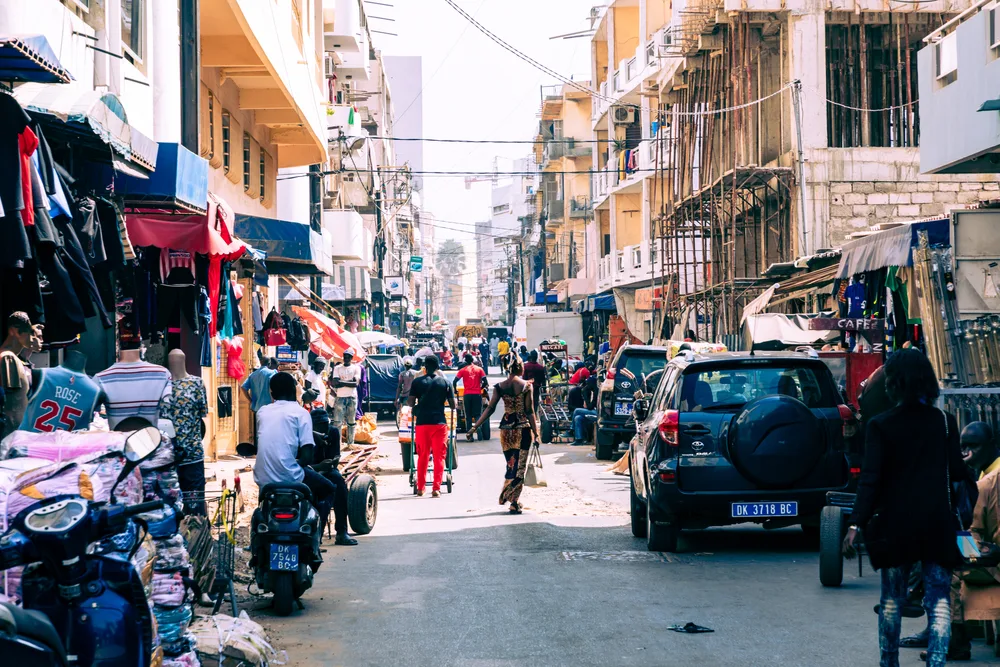
DAKAR, SENEGAL – NOVEMBER 11, 2019: People working and traffic at Senegal capital Dakar, West Africa/Curioso.Photography/Shutterstock
Senegal has a moderate rate of violent crime and an elevated rate of property crime. While it is not the most dangerous place in the world by any means, you will have to keep your wits (and your valuables) about you as you move around the country.
Accurate crime statistics are not always the easiest to source for Senegal (the World Bank doesn’t even have a value on file for the homicide rate).
According to Open Data for Africa data from 2015, Senegal experienced 1,105 homicides in that year, meaning that the homicide rate was 7.4 incidents per 100,000 people. That is higher than the global average, but only slightly.
The good news is that the homicide rate has been declining slowly but steadily over the past decade. Records for other forms of violent crimes, such as assault, rape, and kidnapping, are uneven.
However, according to Numbeo, Senegal scores 40.12 on the crime index when it comes to violent crime, meaning that there is a low level of violent crime (or at least the perception that there is a low level).
Property crime is a different story. The official robbery rate is 16.5 incidents per 100,000 people. A different source puts the theft rate at 12 incidents per 100,000 people.
However, actual numbers are probably much higher. Anecdotal evidence cites high levels of all forms of theft, including pickpocketing, bag snatching, motor vehicle theft, and theft from the back of a motorcycle, especially in big cities such as Dakar.
Many thefts go unreported because people have low faith in authority figures, including the police, due to high levels of corruption and bribery.
The organized crime presence in Senegal is not very widespread, but organized crime syndicates are behind many of the high crime levels. For example, child beggars who aggressively panhandle and even sometimes pickpocket are often victims of human trafficking.
Many foreign criminals use Senegal as a base for their operations, along with the cooperation of corrupt local actors. However, most of the organized crime in Senegal doesn’t affect visitors.
Petty Theft
The most common crime you should be aware of when you visit Senegal is definitely petty theft. The UK government warns its citizens that petty theft is common throughout Senegal, especially in Dakar.
In the capital, pickpockets often target areas that they know are popular with tourists, such as Gorée Island, Place de l’Indépendence, and Western Corniche.
However, you should be vigilant wherever you go in Senegal. Situational awareness is your best friend when it comes to avoiding petty theft. Make sure that you are sticking to well-trafficked roads with plenty of passersby who might help you in case of an emergency, especially after dark.
Make sure that you are not taking out your phone or other valuables in an unfamiliar area (or pretty much anywhere in Dakar). Take photos or look up directions, then quickly return your phone to your front pocket or zipped bag.
Be particularly careful when walking along busy streets. Dakar has many robbers who operate from the backs of motorcycles or scooters, snatching bags and other valuables from pedestrians.
Hold your valuables on the side of your body that is facing away from traffic. Always keep a firm grip on your valuables. If you can, leave valuables at your accommodations in a secure room safe (and choose a hotel with great security).
Besides direct theft, some people might try to take advantage of you with scams. Be careful in markets, especially with money-changing counters, as they often try to pass counterfeit bills.
Street markets are also home to another popular scam, the ebony scam, where sellers claim to be offering valuable ebony, but their product is really painted wood.
Senegal is also becoming one of the world’s centers for online scams, so be careful if you are coming to Senegal to meet an online acquaintance or are in contact with someone claiming to be based in the country.
Common scams are people posing as romantic partners, potential business partners, or people desperate for money.
Terrorism
Many visitors to Senegal are worried about terrorism. Some are worried because they are informed about the region and know that Senegal borders at least two countries with problems with terrorism, Mali and Mauritania.
Others are worried because of stereotypes — all they know is that Senegal is a majority Muslim country. The Canadian government advisory may put your fears of terrorism at rest.
It states that Senegal has not suffered any recent terrorist attacks. However, due to regional instability, the government still warns its citizens visiting Senegal to be alert and to head to safety when they sense danger in a public place.
The UK government mentions that there is some risk of terrorism in remote regions of Senegal that border Mali and Mauritania, especially the area between the cities of Podor and Kedira.
The borders in this region are porous and not well-trafficked, so there is a reasonable suspicion that Sahel-based militants cross into Senegal. Plus, some terrorist groups in Mali, such as the JNIM, have announced that they might target Senegal due to Senegal’s cooperation with peacekeeping forces in Mali.
The risk of kidnapping by militants who want to use Westerners as hostages is high in remote areas. Never travel to remote areas by yourself.
Avoiding Bad Areas
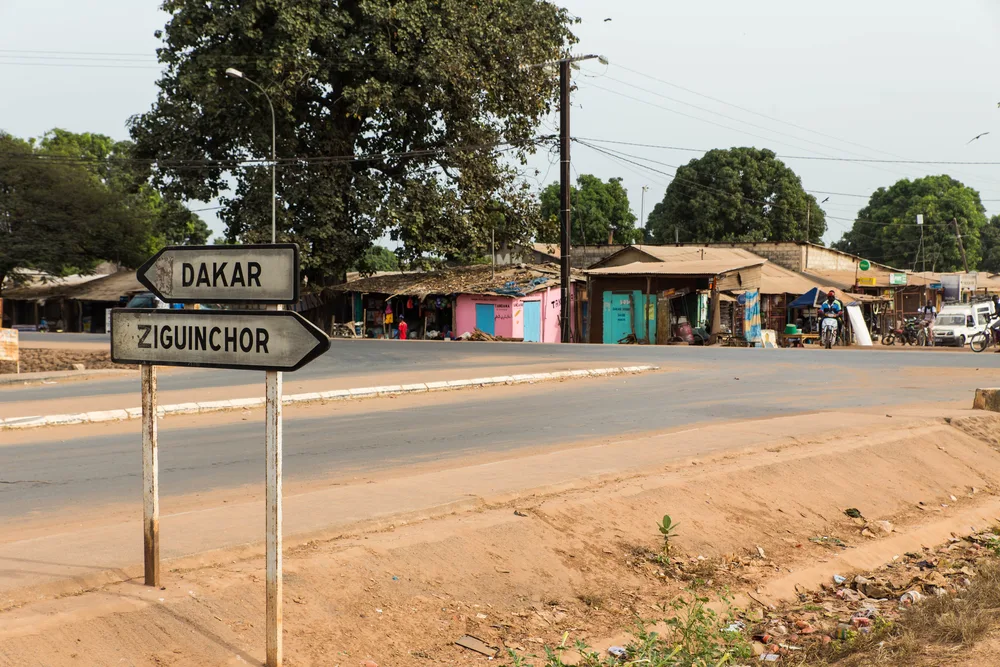
West Africa Senegal Casamance Cap Skirring December 2016 – road sign indicating the direction to Dakar/PhotopankPL/Shutterstock
Certain regions of Senegal are not safe for travel. Most governments advise their citizens to avoid travel to Casamance, the southern region of Senegal with an ongoing separatist movement.
The Australian government tells its citizens that certain parts of this region are safe, namely the cities of Cap Skirring and Ziguinchor. However, avoid all but necessary travel to the rest of the region due to the ongoing low-level conflict and high risk of landmines (most of which are unmarked).
Avoid traveling to the north and east, specifically the border areas of Mali and Mauritania. There is a risk of terrorist groups coming over the border, and law enforcement reach in this remote region is spotty at best.
Things to Consider
Here are some safety tips to keep in mind as you head to Senegal:
- Most international flights arrive in Senegal late at night or in the wee hours of the morning, so be prepared for jet lag and exhaustion — as well as the crush of taxi drivers. Prearrange your airport transfer if possible, and make sure that you confirm the identity of the person who picks you up before getting into any unknown vehicles.
- When traveling between cities, try to get a reputable private driver if possible or take a sept-place taxi as public transportation is slow and unreliable. Only travel during the day, as highway robbery is common.
- Panhandlers are often aggressive in trying to get money from you, so practice saying no and ignoring their attention (while keeping a firm grip on your wallet).
- Senegal is a Muslim country, but the dress code is more relaxed than in other Muslim countries. You still want to wear long, loose clothing to protect you from the sun.
Frequently Asked Questions
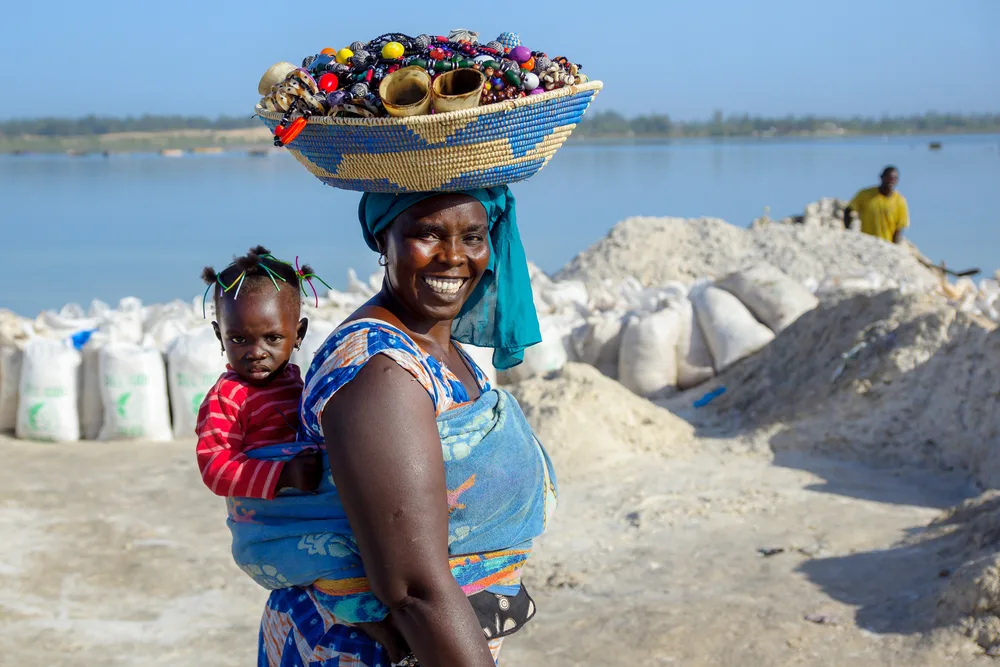
DAKAR/SENEGAL – NOVEMBER 12, 2013: Senegalese smiling woman with a basket of handmade jewelry and souvenirs for sale on her head and a baby on her back at the Retba salt lake near Dakar, Senegal/Vladimir Zhoga/Shutterstock
Here are some questions you may want answered about Senegal:
Is Senegal safe for female tourists?
Yes, Senegal is generally safe for female tourists. However, levels of street harassment are high, so you may encounter uncomfortable situations while you are in town.
Can you drink alcohol in Senegal?
Although Senegal is a Muslim country, alcohol is still available, and you can get it at most restaurants in Dakar (there are even bars and breweries). However, public drunkenness is heavily frowned upon.
Is Senegal a friendly country?
Senegal has a reputation as a very friendly country. The concept of “teranga,” which translates to hospitality, is very important in the local culture.
Is Senegal a good place to go?
Yes, Senegal is a great place to go! It is a relatively safe country with a lot of sights to offer. Plus, it is not on the radar of many tourists yet, so you can avoid overcrowding as you explore the best areas.
Can I wear shorts in Senegal?
Although Senegal has a less conservative dress code than most Muslim countries, shorts are still frowned upon — for both men and women. It is not illegal to wear shorts, but it is frowned upon, and you won’t be able to visit mosques and other religious places.
So, Is It Safe to Travel to Senegal?
Senegal is safe to visit as long as you take the right precautions. Keep a firm grasp on your valuables at all times, do your research when moving around the country, and only choose reliable methods of transportation, and you’ll have a great time in Senegal. Happy travels!



